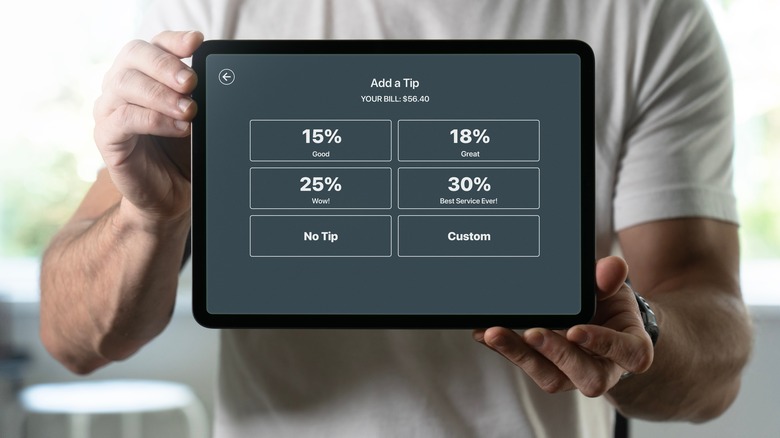You Probably Don't Tip At Fast Food Restaurants, But Should You?
Since the onset of the pandemic, customers have increased the average tip-per-order at fast food restaurants by $1.24, according to the National Institute of Health, reflecting a growing recognition of the risks service workers faced in 2020. The introduction of touch-screen tip tablets has further intensified this pressure, making it easier for customers to feel obligated to tip higher percentages. The U.S. Department of Labor statistics reveal that the federal minimum hourly wage for tipped employees is $7.25, with a maximum tip credit of $5.12, while the minimum cash wage is just $2.13. This idea was cemented by Congress in 1966, and no federal changes have been made to it since 2007 — nearly 20 years. As inflation, or as some say 'tip-flation, drives up prices, many diners feel pressured to tip more, raising concerns that businesses rely on gratuities instead of providing livable wages.
This rise in tipping creates an uncomfortable dynamic not only for many diners but also for the employees. Social pressure can make the decision feel daunting, particularly when suggested amounts range from 15 to 20, even 30 percent or higher. Customers often find themselves struggling to navigate these automated prompts, leading to feelings of guilt or hesitation. But there are two sides to every coin, right? To those who say why would I tip for an already pricey $8 coffee, there's someone with a flipped response. They may wonder why they should give $2 in tip to an already $8 drink. However, patrons should remember that tipping is a personal choice — it's perfectly acceptable to decline or customize the tip based on their own financial situation.
The importance of tipping
Tipping has become essential for many workers, as their hourly wages often fall short of covering basic living expenses. In Pennsylvania, an employee earning the minimum wage of $7.25 for a 40-hour week struggles to stay above the federal poverty line of $2,699 monthly. While individuals should tip when financially able, they must feel empowered to adjust suggested amounts on automated systems, ensuring their contributions remain manageable for themselves.
Many service workers depend on these funds to live, as their base pay often does not reflect the true cost of living. This reliance on tips raises a pressing question: Why do people in the U.S. depend on tipping compared to other countries? The answer may lie in the need for living wages to be met, highlighting a systemic issue in how we compensate service workers. So, when you aren't sure if you should tip or not at your local cafe, diner, or fast-food spot or not, try to if you're able, and remember — leaving less than 20 percent doesn't make it a bad tip.

